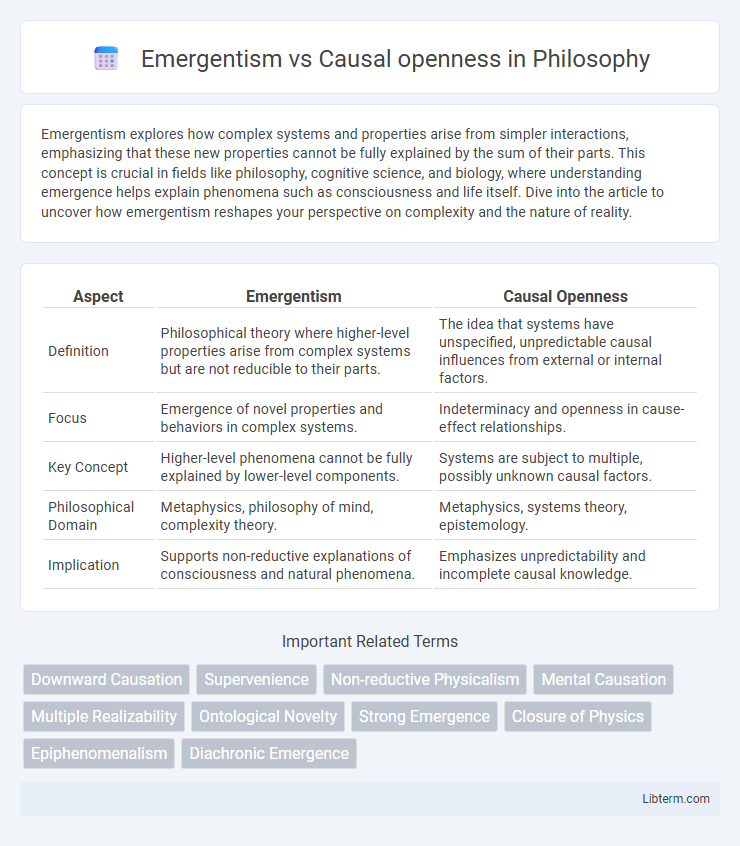Emergentism explores how complex systems and properties arise from simpler interactions, emphasizing that these new properties cannot be fully explained by the sum of their parts. This concept is crucial in fields like philosophy, cognitive science, and biology, where understanding emergence helps explain phenomena such as consciousness and life itself. Dive into the article to uncover how emergentism reshapes your perspective on complexity and the nature of reality.
Table of Comparison
| Aspect | Emergentism | Causal Openness |
|---|---|---|
| Definition | Philosophical theory where higher-level properties arise from complex systems but are not reducible to their parts. | The idea that systems have unspecified, unpredictable causal influences from external or internal factors. |
| Focus | Emergence of novel properties and behaviors in complex systems. | Indeterminacy and openness in cause-effect relationships. |
| Key Concept | Higher-level phenomena cannot be fully explained by lower-level components. | Systems are subject to multiple, possibly unknown causal factors. |
| Philosophical Domain | Metaphysics, philosophy of mind, complexity theory. | Metaphysics, systems theory, epistemology. |
| Implication | Supports non-reductive explanations of consciousness and natural phenomena. | Emphasizes unpredictability and incomplete causal knowledge. |
Introduction to Emergentism and Causal Openness
Emergentism posits that complex systems exhibit new properties and behaviors that arise from interactions among simpler components, which cannot be fully predicted by studying these components in isolation. Causal openness emphasizes that systems are influenced by external factors and unpredictable interactions, making their behavior not strictly determined by internal mechanisms. Both concepts challenge reductionist views by highlighting the limits of predictability and underscoring the significance of system-environment interactions.
Defining Emergentism: Key Concepts
Emergentism centers on the idea that complex systems exhibit properties and behaviors not predictable from their individual components, emphasizing novel qualities arising at higher organizational levels. Key concepts include non-reducibility, where emergent properties cannot be fully explained by underlying physical processes, and downward causation, where emergent phenomena influence the behavior of the system's parts. This contrasts with causal openness, which stresses indeterminacy and unpredictability in system interactions without necessarily invoking new ontological properties.
Understanding Causal Openness
Causal openness refers to the concept in systems theory where a system's behavior cannot be fully predicted due to external influences or internal complexities that introduce unpredictable variables. This contrasts with emergentism, which emphasizes properties arising from interactions within a system that are not reducible to individual components. Understanding causal openness is crucial for analyzing dynamic systems, as it highlights the limitations of deterministic models and the importance of considering external inputs and context-dependent factors.
Historical Context and Philosophical Roots
Emergentism originated in the 19th century as a response to reductionist materialism, emphasizing that complex systems exhibit properties not predictable from their individual components. Rooted in the works of philosophers like C. Lloyd Morgan and John Stuart Mill, emergentism challenges strict causal determinism by proposing that new causal powers arise at higher levels of organization. Causal openness, influenced by quantum mechanics and process philosophy, argues that not all events are determined by prior states, emphasizing indeterminacy and the limits of predictability in natural processes.
Emergent Properties vs. Causal Determinism
Emergent properties arise when complex systems exhibit behaviors or characteristics that are not predictable from the sum of their parts, challenging traditional causal determinism which holds that every event is the inevitable result of preceding causes. Emergentism emphasizes that novel properties can spontaneously arise through interactions within the system, implying causal openness and a potential break from strict deterministic laws. This contrast highlights a fundamental debate in philosophy of science about whether the universe is fully predictable or allows for genuine novelty and behavioral unpredictability at higher organizational levels.
Major Arguments for Emergentism
Emergentism argues that higher-level properties arise from complex systems and cannot be fully explained by their constituent parts or causal mechanisms alone. Major arguments emphasize the irreducibility of mental states to physical processes, highlighting novel properties and causal powers that emerge at higher organizational levels. This perspective challenges causal openness by asserting that emergent phenomena introduce new causal relationships not predictable from prior states.
Debates on Causal Openness in Philosophy of Mind
Debates on causal openness in the philosophy of mind center on whether mental states exert genuine causal power beyond physical brain processes. Emergentism argues that complex mental properties arise from but are not reducible to neural activity, allowing for new causal capacities. Critics of causal openness maintain that physicalism sufficiently explains mental causation, challenging emergentist claims of independent mental causality.
Comparing Emergentism and Causal Openness
Emergentism posits that complex systems generate novel properties not reducible to their components, emphasizing hierarchical organization and new causal powers at higher levels. Causal openness argues that systems interact with their environment in unpredictable ways, resisting deterministic closure and allowing for external influences to shape system behavior. Comparing emergentism and causal openness highlights emergentism's focus on intrinsic novel properties versus causal openness's emphasis on system-environment interactions and indeterminacy in causal chains.
Implications for Science and Metaphysics
Emergentism asserts that complex systems exhibit properties not reducible to their constituent parts, challenging reductionist approaches in science and implying layers of reality with novel causal powers. Causal openness emphasizes the unpredictability and non-deterministic nature of complex interactions, suggesting limits to scientific determinism and promoting metaphysical frameworks that accommodate genuine novelty and contingency. These perspectives jointly impact scientific methodologies by calling for holistic models and reshape metaphysical debates on the nature of causality, free will, and the structure of reality.
Future Directions and Open Questions
Emergentism explores how complex systems exhibit properties not predictable from their individual components, raising questions about the limits of reductionist explanations in physics and biology. Causal openness challenges deterministic models by emphasizing indeterminacy and novel causal interactions, prompting research into how unpredictable factors influence system behavior. Future directions involve integrating computational models and empirical data to clarify the roles of emergent properties and causal dynamics in complex adaptive systems.
Emergentism Infographic

 libterm.com
libterm.com